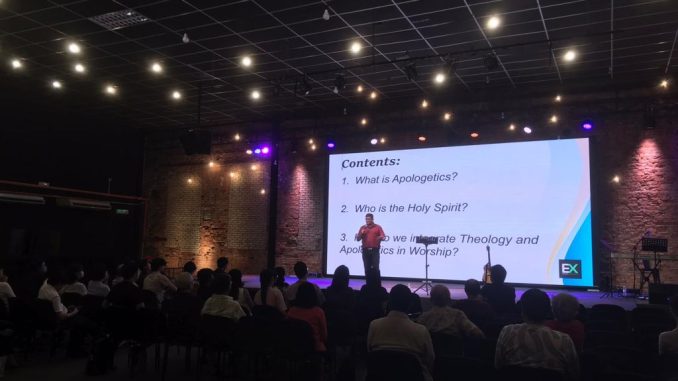
We often think of worship in terms of music and as an emotional experience but it is actually more than that. Worship is one of the most vital aspects of the Christian faith. Rather than couched merely in terms of music, the Biblical definition of worship is in fact the “Confession of Biblical Truth through the Spirit’s Power”. It is with the goal of helping and guiding believers to this understanding that Explain International recently hosted and organised the Spirit and Truth Conferences.
The conferences were held concurrently with the month of Pentecost, and takes its name and inspiration from John 4:23-24 in which Jesus revealed to the Samaritan woman of the day when true worshippers will worship the Father in the Spirit and in truth, for such worshippers are the kind the Father seeks. Because God is spirit, our worship to Him must be in the Spirit and in truth.
The Spirit and Truth conferences were held in multiple states, first in Kuala Lumpur at FGA KL on the 10th-11th of May, and later also in Penang. The Penang conference was held at City Light Church on the 15th-16th of May in partnership with Dr. Esther Shin Chuang who taught on Biblical Theology of Worship and was the keyboardist.


A highlight of the Kuala Lumpur Conference was the debate on 10th May between Samuel Nesan (defending the traditional Trinitarian doctrine), and Rodney Smith from the Oneness Pentecostal movement that have been in the headlines lately.
Traditionally, Christians have held to the Trinitarian doctrine that God exists as three persons but is one being, having a single divine nature. The doctrine holds that members of the Trinity are co-equal and co-eternal, one in essence, nature, power, action, and will. Though God is One, the persons of the Father, Son (Jesus), and Holy Spirit are distinct from each other. In simple terms, the Father is not the same person as Jesus and Holy Spirit, Jesus is not the same person as the Father and the Holy Spirit, and the Holy Spirit is not the same as the Father and Jesus. Each of the persons in the triune God have different roles.

The Oneness Pentecostal movement derives its name from its teaching on what is commonly referred to as the Oneness doctrine. The doctrine states that there is one God―a singular divine spirit with no distinction of persons―who manifests himself in many ways, including as Father, Son, and Holy Spirit.
The Oneness doctrine thus stands in sharp contrast to the doctrine of three distinct, eternal persons posited by Trinitarian theology. Because the fine line between Trinitarian and Oneness doctrine can be confusing, the debate was also a valuable opportunity for believers to listen to the arguments from both sides, and for believers, to understand the vital difference between the two doctrines. A central text in the debate is Jesus’s baptism at the Jordan River where Father, Son, and Holy Spirit were all present as distinct persons (Matthew 3:13-17).

Samuel Nesan also shared on the following morning an overview of worship in the Bible from Genesis and the Old Testament times until the New Testament era. He shared a few profound insights from important theologians about the essence of worship. It is God who gives us the spirit of worship (Psalm 133:3), and it is what we know of God that produces this spirit of worship: Sinclair Ferguson. To worship is to quicken the conscience by the holiness of God, to feed the mind with the truth of God, to purge the imagination by the beauty of God, to open the heart to the love of God, to devote the will to the purpose of God: William Temple. Missions are not the ultimate goal of the church. Worship is. Missions exist because false worship does: John Piper and Travis Kerns.
We see all these truths expressed in the narrative of the Bible. In Genesis, we see how God created humanity in the image of God (Gen 1:26-28). We were created to reflect God’s glory before creation, to think God’s thoughts after Him, to dedicate creation back to its Creator, to reign over the earth with God. Humanity was intended to be in such intimacy with God. In Genesis 3, we read of how Satan broke this bond between humanity and God through deception but we also read about God’s Covenant of Redemption.

Abel and Cain’s story illustrates an important and key truth that God’s Word and Covenant are the foundation of true worship (Genesis 4:1-16 with emphasis on 4:7). John Stott expressed it thus: God must speak to us before we have any liberty to speak to Him. He must disclose to us who He is before we can offer Him what we are in acceptable worship. Worship of God is always a response to the Word of God and Scripture wonderfully directs and enriches our worship. Knowing that our worship of God must necessarily be first initiated by God and that it is a response to His Word, Samuel expressed one of the central challenges of our worship: do we go deep enough so that our worship is Biblically Derived or do we try to compromise and settle for it to be merely Biblically Compatible?
This idea of God’s Word and Covenant forms the foundation of worship throughout the Old Testament, later expressed in Genesis 22:5, Exodus 3:12 and Exodus 8:1. Central to worship is God’s presence amid His people in the form of the tabernacle and the Ark of the Covenant. God saves His people so that having been freed from oppression, we can worship in His presence. For the Old Testament prophets, their hope was that God would one day set up a righteous Kingdom where God will dwell with His people. The last Old Testament prophet Malachi sums up the Old Testament with the promise of God cleansing His people and the temple before accepting their worship.

The new covenant that Jesus brought, and as related to us in the New Testament, shifted the paradigm. We see New Testament worship through the Christmas Command (Hebrews 1:8), the worship of the angels (Luke 2:13-14), the worship of the magi (Matthew 2:1-2), and Jesus spoke and taught about worshipping in Spirit and in Truth (John 4: 1-12). When the Holy Spirit came to reside in us, it shifted the focus of our worship from a temporal place such as a physical kingdom into the spiritual dimension. Today, God’s presence is always with those He has elected and we have the Holy Spirit with us to guide and counsel us and to steer us in the right direction of making God’s Word and Covenant the focus of our worship.
Brock James, worship leader from the SWBTS School of Church Music and Worship, was a very much appreciated and valued partner for the conference. Brock shared from the perspective of a worship leader on balancing the emotive part of our being (an inherent quality of humans) with the proper focus in song and music worship leading so that worship leaders can foster a Spirit-fueled and Proskuneo Christian worship (read the accompanying interview article by Joidan Lau from Explain International here).


Brock and his ministry partner, along with the team at Explain International also led breakout workshop sessions with a range of topics including Leading Worship with Musical Instruments, How to Build Worship Leaders Through Your Ministry, How to Study and Teach the Bible (Worship in Truth), and How to Do Spirit-Led Apologetics.


The conference participants were thoroughly blessed. It brought a deeper appreciation of worship and placed it in the right framework. Many questions were asked and many were answered. In addition, Greenhouse Publishing was also another valued partner for the conference and the books they made available at a cost-friendly price were a valuable source of resources for our faith.


The writer and Christianity Malaysia would like to thank Explain International for their hospitality throughout the conference. All photos kindly contributed by Explain International.
|Share The Good News|




Leave a Reply